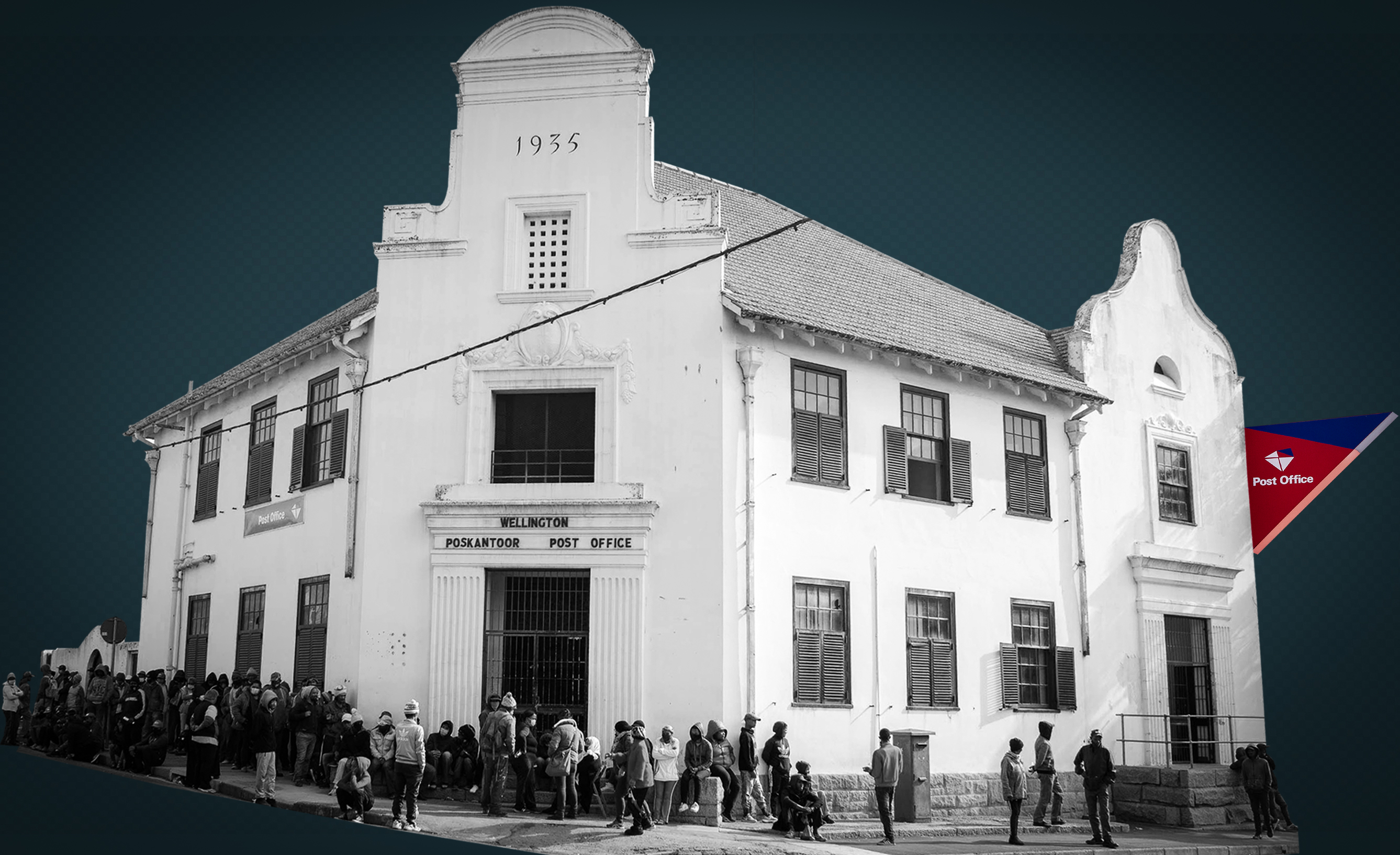Some days a lifeline arrived as an SMS. For Daddy Mabe, the beep-beeping on his phone with a message that R350 had been deposited into his bank account from a government grant changed the day’s fortunes.
“You can take 72 hours just to raise R20 when you have nothing, so when it happens that you get R350 at a go, it helps a lot. You can be sitting thinking how am I going to eat today and then that notification comes – you stand up, you have energy, you can go do a couple of things that need to be covered; it means a lot,” Mabe says.
Mabe is an activist with #PayTheGrants. He received the Social Relief of Distress (SRD) grant – the so-called Covid grant – in 2022 and 2023 for just over a year before he found temporary work helping University of Johannesburg researchers with their fieldwork on grant recipients. At the time the grant was R350. Currently he’s unable to reapply for a grant because of the technicality of having worked a temporary job.
The current SRD grant extension lasts until the end of March 2026. What comes after that is not clear. Mabe knows this uncertainty places millions in precarity. For him, he survives by continuing his activism work and taking on piece jobs as a handyman. Mabe makes it clear that “work” is the keyword here.
“We are grant claimants, but we are also working. We are volunteers; we are activists. We are doing the cooking, the gardening and cleaning at places where we stay, we are asking neighbours for small jobs – we are working. So this narrative that SRD claimants are lazy is a lousy narrative; we should not be demonised,” he says.
/file/dailymaverick/wp-content/uploads/2025/08/0000161654-1.jpg)
Mabe’s reality is the reality of millions of South Africans. South Africa consistently ranks, by World Bank data, as the country with the highest inequality levels. The majority of people don’t have access to income, wealth or opportunity which is concentrated in the hands of the minority.
As the World Bank country brief states: “The country has made little progress in reducing inequality in recent years. The main sources of inequality are inequality of opportunity and disparities in factor markets, with the legacy of apartheid playing a major role and access to jobs and land being severely constrained and uneven.”
This continued crisis of inequality in South Africa sets the backdrop for the question of what comes next if the SRD grant is scrapped. It also puts the spotlight on the case for South Africa, with its dire inequalities, histories and legacies, to be the first country in the world to implement an unconditional universal basic income grant.
Read more: Economic growth can be stimulated in SA by affording basic income grant to poor
The debate remains contentious though. In January the #PayTheGrants campaign and the Institute for Economic Justice (IEJ) were successful in the case they brought against National Treasury and the South African Social Security Agency (Sassa). They challenged the exclusion of millions prejudiced by the application processes and conditions set for accessing the grant.
The court also ordered an increase in the value of the grant. It currently stands at R370 a month, and R35.2-billion has been allocated to maintain that amount, including administration costs.
But Treasury and Sassa appealed the ruling and the legal wrangling continues.
For Dr Kelle Howson from the IEJ, however, the fact that the SRD grant remains in place, even with challenges, including the court appeal, is an acknowledgement that the demand for an income safety net is growing.
She says that since the late 1990s already, South Africa has had the conversation about a universal basic income grant (UBIG). She says that, over the years, many commissions and reports, including work done by the IEJ, have come to the same conclusion that a UBIG could help solve many of society’s systemic problems.
“It’s a smart option; a universal basic income grant not only alleviates poverty but supports sustainable and inclusive economic growth and employment,” Howson says.
/file/dailymaverick/wp-content/uploads/2024/10/Matisonn-BETWEENTHELINESPoverty.jpg)
/file/dailymaverick/wp-content/uploads/2024/06/7609255.jpg)
UBIG means an unconditional grant of an amount above the poverty line, given to all working-age people who apply for it. Howson says this system is easier to administer and also less susceptible to corruption. In this model, fewer people fall through the cracks and, at a proposed amount that is not the barest minimum to survive, it allows people to have more economic certainty and money left over with which to shape their lives.
Basic income grants have been trialled in many countries but not yet implemented as policy in a single one. But where it has been tested, it has been found to have a wide-ranging positive impact. This includes a reduction in crime, improvement in health outcomes, improving chances of finding employment, bolstering social cohesion and allowing people to be part of the transition to renewable energies, which is essential to respond to the pressing climate crisis that disproportionately affects poorer nations and communities.
She says a large part of why UBIG remains off the table is because of entrenched myths around costs and the negative impacts of UBIG. “People still hold on to these ideas that it’s not affordable, that it will create dependency and laziness. But the evidence shows that this is just not the case, these really are myths.”
Howson says it circles back to political will and answering the questions of who benefits from not implementing UBIG; also, who South Africa owes money to, such as the World Bank and the International Monetary Fund, and what their interests and conditions are.
“It’s the kind of fiscal conservatism that ultimately benefits the financial sector, creditors and the wealthiest in our society. There’s an inability from policymakers to look past the myths and to see the benefit of investing in excluded communities and people.”
Read more: Investing in human dignity: Why basic income support grants are crucial for a just society
Dr Courtney Hallink is a research fellow at the Southern Centre for Inequality Studies at Wits University. Hallink, a sociologist, says that her research holds a stark warning that arguments that say grants are handouts that create dependency and laziness have their roots in the dark part of the country’s history – “used by apartheid and before that, colonial officials, to justify excluding black South Africans from the welfare state”.
Hallink adds that funding UBIG is also mistakenly cast as something that will be an additional burden on individual taxpayers. “The funding proposals for UBIG could come from better tax compliance and mining royalties especially from international companies that benefit from the mineral wealth in the country but are not directly invested in South Africa.”
Another funding path, she says, could come from cutting wasteful government expenditure. And, she points out, money spent by grant recipients is also money that returns to government coffers as part of value-added tax collection.
/file/dailymaverick/wp-content/uploads/2024/01/26-Vulnerable-kids.jpg)
/file/dailymaverick/wp-content/uploads/2022/09/MC-SRD-Grant-critical_2.jpg)
Hallink adds: “South Africa’s inequality, its history of labour suppression and the legacies of apartheid on unemployment should be convincing arguments for a basic income grant that is set above the upper-bound poverty line [just more than R1,600 a month].”
Mervyn Abrahams of the Pietermaritzburg Economic Justice and Dignity Group believes more evidence lies in the findings from their two-year project testing how an unconditional grant could have the potential to break chains of poverty, to improve employment numbers and to stimulate entrepreneurship.
In their pilot project, which started in 2022, they gave R2,000-a-month unconditional grants to 100 Technical and Vocational Education and Training college-trained graduates who were unable to find work. At the end of the two years they found that 74% of the recipients were economically active and some had diversified into self-employment. Six months after the project that number dropped to 69%, but this remained way higher than South African benchmarks for youth unemployment.
“The first thing this taught us is that skills training is not sufficient. Also that the value of a grant is important because we know that after money has gone to food, toiletries, transport and energy there must be money left over so that the person can invest in some economic activity,” Abrahams says.
The next step, he says, is to scale up their project and implement it in other provinces. He believes this will bolster evidence for the government to start thinking differently.
“We have had things like employment subsidy schemes that have run for years but unemployment has just gone up. It should be clear that it’s time to allocate money to align with our priorities and to be guided by the evidence.
“We also need to understand that a UBIG is a matter of national security; it is a matter of ensuring social stability and that is something that benefits everyone – including those who don’t believe in a universal basic income grant.” DM





 Illustrative Image | Social grant beneficiaries stand in a snaking line outside the Post Office in Wellington, Western Cape. (Photo: Gallo Images / ER Lombard) | (Gallo Images / Sharon Seretlo)
Illustrative Image | Social grant beneficiaries stand in a snaking line outside the Post Office in Wellington, Western Cape. (Photo: Gallo Images / ER Lombard) | (Gallo Images / Sharon Seretlo)